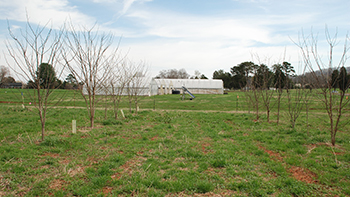Strategic Cropping System to Promote Climate Change Resiliency
Apr 24, 2023

Researchers and Extension specialists at the University of Tennessee Institute of Agriculture have received a grant to study alley cropping as a viable solution to mitigate crop stress and improve the sustainability of organic vegetable production amid climate extremes in the Southeast. Alley cropping is an agroforestry practice where herbaceous annual crops are grown in wide alleys between rows of trees.
Given the increasing frequency of extreme weather events induced by climate change, the buffering ability of trees will likely increase resiliency of regional vegetable production. Vegetable crops can be susceptible to stress induced by heat extremes, which can significantly reduce yields and quality.
Alley cropping systems involve planting rows of leguminous trees, in this case black locust and honey locust, to provide dappled shading that reduces excess heat without negatively affecting vegetable crops planted in between the rows of trees. In addition to moderating temperature extremes, the trees increase landscape biodiversity, lessen evaporation and wind velocity, and reduce the impact of heavy rainfall. The cropping system also has the potential to improve soil fertility due to plant nutrients recycled in tree litterfall, reducing the need to amend the soil with costly fertilizer. Further, the system promotes carbon storage and creates a mutually beneficial environment where key nutrients are exchanged.
“Our researchers and specialists will evaluate, innovate, and extend knowledge of alley cropping systems’ ecological function and their potential integration in the social and economic framework of the existing organic and similarly managed vegetable cropping systems in the region,” said lead researcher David Butler, professor in the UT Department of Plant Sciences.
Considering only 1% of farms in the U.S. have adopted agroforestry systems like alley cropping, it is likely that the lack of technical knowledge regarding system design and management, as well as information on economic feasibility, are barriers to adoption. This study aims to address these barriers.
“Our work in this project is largely targeted to certified organic and similarly managed production systems, as these growers have a greater familiarity and acceptance of similar ecosystem-based management strategies,” said Butler. “If successful, our results will lead to further establishment of alley cropping systems on organic farms in the region and should later transfer to conventional systems, potentially providing larger-scale benefits to environmental sustainability.”
The research team has partnered with producers in all three regions of the state, with four on-farm sites in rural and urban locations. Further, they have partnered with Memphis Tilth and the Appalachian Resource Conservation & Development Council to facilitate grower outreach. The project has an integral educational component that includes on-farm workshops and demonstrations.
The study team includes David Butler, Avat Shekoofa, and Annette Wszelaki from the Department of Plant Sciences, and Carlos Trejo-Pech and Margarita Velandia from the Department of Agricultural and Resource Economics. This three-year grant is funded by USDA-NIFA through Sustainable Agriculture Research and Education program.
For more content like this, check out the latest issue of The Cooperator.
Given the increasing frequency of extreme weather events induced by climate change, the buffering ability of trees will likely increase resiliency of regional vegetable production. Vegetable crops can be susceptible to stress induced by heat extremes, which can significantly reduce yields and quality.
Alley cropping systems involve planting rows of leguminous trees, in this case black locust and honey locust, to provide dappled shading that reduces excess heat without negatively affecting vegetable crops planted in between the rows of trees. In addition to moderating temperature extremes, the trees increase landscape biodiversity, lessen evaporation and wind velocity, and reduce the impact of heavy rainfall. The cropping system also has the potential to improve soil fertility due to plant nutrients recycled in tree litterfall, reducing the need to amend the soil with costly fertilizer. Further, the system promotes carbon storage and creates a mutually beneficial environment where key nutrients are exchanged.
“Our researchers and specialists will evaluate, innovate, and extend knowledge of alley cropping systems’ ecological function and their potential integration in the social and economic framework of the existing organic and similarly managed vegetable cropping systems in the region,” said lead researcher David Butler, professor in the UT Department of Plant Sciences.
Considering only 1% of farms in the U.S. have adopted agroforestry systems like alley cropping, it is likely that the lack of technical knowledge regarding system design and management, as well as information on economic feasibility, are barriers to adoption. This study aims to address these barriers.
“Our work in this project is largely targeted to certified organic and similarly managed production systems, as these growers have a greater familiarity and acceptance of similar ecosystem-based management strategies,” said Butler. “If successful, our results will lead to further establishment of alley cropping systems on organic farms in the region and should later transfer to conventional systems, potentially providing larger-scale benefits to environmental sustainability.”
The research team has partnered with producers in all three regions of the state, with four on-farm sites in rural and urban locations. Further, they have partnered with Memphis Tilth and the Appalachian Resource Conservation & Development Council to facilitate grower outreach. The project has an integral educational component that includes on-farm workshops and demonstrations.
The study team includes David Butler, Avat Shekoofa, and Annette Wszelaki from the Department of Plant Sciences, and Carlos Trejo-Pech and Margarita Velandia from the Department of Agricultural and Resource Economics. This three-year grant is funded by USDA-NIFA through Sustainable Agriculture Research and Education program.
For more content like this, check out the latest issue of The Cooperator.